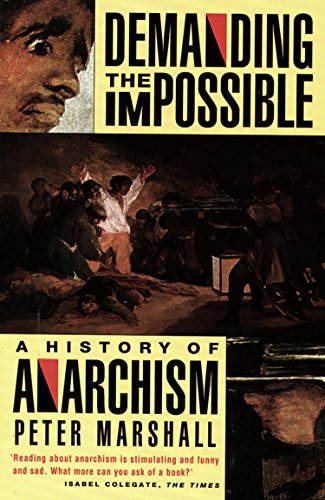Demanding the Impossible

I've always been attracted to the freedom and responsibility of the individual inherent in anarchism as a political philosophy.
It was my readings of Noam Chomsky and interviews he'd given on anarchism that first made me identify as an anarchist. Still, as someone who considers themself as a democrat might never have heard of the demos in Athens, I wasn't really aware of the history of anarchism and the thinkers who had contributed to it over time.
Wandering aimlessly in Waterstone's bookshop in Gower St London, this title jumped out at me as something which might fill in the gaps of my understanding of anarchism. It was almost not so much to deepen my understanding of anarchism that I wanted to read it, but so that I might understand the totality of what was meant when I used the term.
The book is long, the print is small, this is not a tome for those with short attention spans. It rambles on in a strange course as well, tempting one to wonder whether the meaning of anarchy as disorder was a guiding principle in its development, but it was navigable and I made it through. Perhaps on rereading this book, as I intend to do, I'll understand better why it is laid out as it is.
Anarchism as a word comes from the ancient Greek, but being espoused in its modern sense as a political philosophy only began with the Frenchman Proudhon in the first half of the 19th century.
The book, however, goes back in history looking for people that could be called anarchists. It is roughly laid out chronologically wandering from the ancient Greeks, Taoists and Buddhists, on through anarchist religious sects in the middle ages such as the Divine Heresy, onto the intellectual founders of modern anarchism, Godwin and Proudhon, onto the times when anarchists assassinated heads of state in the 1890s and essentially destroyed anarchism as a valid political philosophy for decades, then to the anarchist communities in Spain crushed by the fascism in the 1930s and finally the more modern anarchists of the latter 20th century.
There are also many chapters discussing various aspects of anarchism and bringing together, often repeating, parts from the sections about individual anarchists.
If you are interested in Anarchism and wonder what people like Bakunin, Oscar Wilde, Tolstoy, Gandhi and Chomsky said about it, you are going to find it in this book and much more. If you want to be challenged intellectually this book will do that at every turn. Get rid of states, remove prisons, let people organise their own work, the theories set out in this book are as radical as it gets.
It informed my anarchism, made me aware of everything represented by that term, and left me more committed to the ideals of anarchism as a guiding force for the development of the individual into our future.
Find this book
Search for a second hand copy of Demanding the Impossible on World of Books